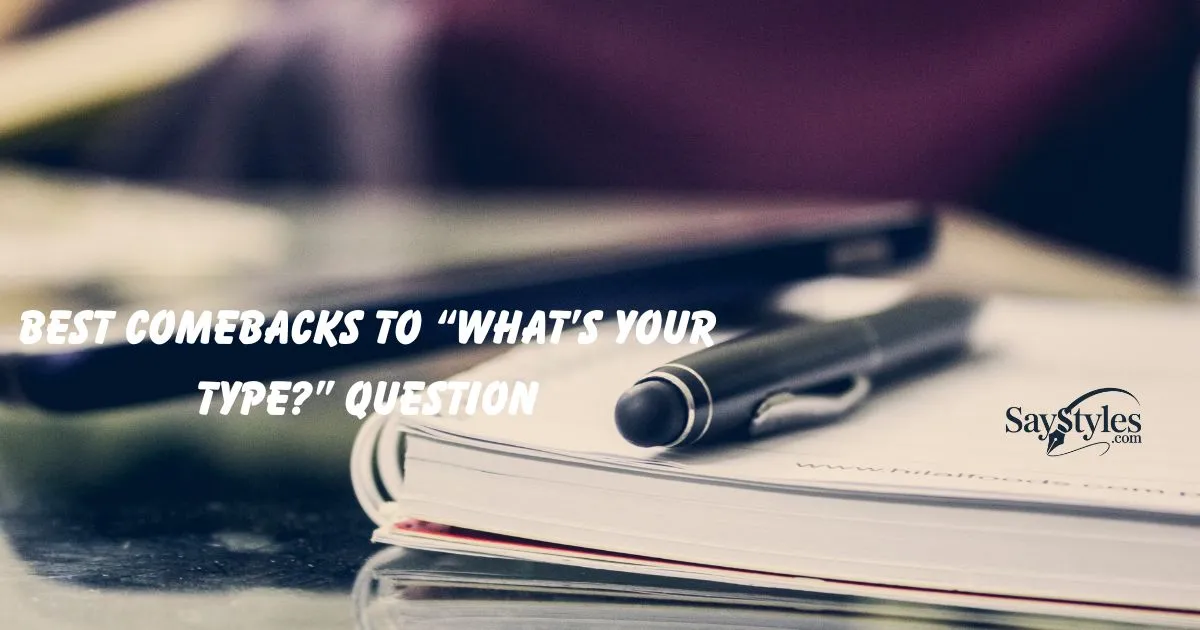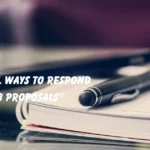“When someone asks, ‘What’s your type?’ the best comeback is confidence, not categories.”
Hey there! I’m the kind of person who’s been hit with this question more times than I can count — and trust me, I’ve learned that having the best comebacks to “What’s your type?” makes all the difference. Whether it’s in a casual chat or a flirty moment, this question can catch you off guard. That’s why I’m here, sharing some clever, bold, and funny responses that actually work in real life.
You don’t need fancy words or long explanations, just quick, smart replies that leave the other person smiling or speechless. And don’t worry, I’ve kept the tone easy, playful, and something anyone from grade onward can enjoy and use.
In this article, you’ll find the best comebacks to “What’s your type?” that are fresh, fun, and full of personality perfect for anyone who wants to turn the question around with style.
What ‘What’s Your Type?’ Really Means
When someone asks “What’s your type?”, it usually expresses curiosity about preferences, attraction, or compatibility. In casual or flirty conversations, it’s a perfect setup for funny or witty responses, turning a simple question into a playful, engaging moment.
“I’m attracted to confidence and kindness.”
Story: You admire people who carry themselves well and treat others with warmth.
When to Use: When someone asks about your preferences or values in a partner.
When Not to Use: If you’re trying to keep things light and not too serious.
Example:
Them: “So, what kind of people catch your eye?”
You: “I’m attracted to confidence and kindness.”
How to Respond: Say it with sincerity and a soft smile—it shows depth.
“I like someone who’s adventurous and loves to laugh.”
Story: You’re drawn to someone who brings joy and thrives on exploring life.
When to Use: When you want to show you’re all about fun and spontaneity.
When Not to Use: If the conversation is leaning toward serious or emotional topics.
Example:
Them: “What’s your ideal weekend date?”
You: “I like someone who’s adventurous and loves to laugh.”
How to Respond: Laugh a little, as if recalling a memory—it makes it real.
See also: Polite & Funny Replies to “OK, Sounds Good” That Impress
“I appreciate someone who’s intellectually curious.”
Story: You value meaningful conversations and someone who keeps learning.
When to Use: When talking about passions, books, or personal growth.
When Not to Use: In light banter or casual first chats.
Example:
Them: “What kind of people do you vibe with?”
You: “I appreciate someone who’s intellectually curious.”
How to Respond: Keep eye contact and nod—it shows mutual respect.
“I’m drawn to creativity and passion.”
Story: You’re all about heart and soul—someone who expresses themselves boldly.
When to Use: When the topic turns to dreams, talents, or inspiration.
When Not to Use: If you’re with someone who values logic over emotion.
Example:
Them: “What do you look for in someone?”
You: “I’m drawn to creativity and passion.”
How to Respond: Say it with a spark in your eyes—it’s contagious.
“I like someone who’s supportive and understanding.”
Story: You believe strong relationships are built on empathy and care.
When to Use: During discussions about relationships or emotional connection.
When Not to Use: If you’re aiming for playful teasing.
Example:
Them: “What’s most important in a relationship for you?”
You: “I like someone who’s supportive and understanding.”
How to Respond: Share a quick story if you can—it adds depth.
“I appreciate someone who’s ambitious and driven.”
Story: You admire people who chase their goals and push for more.
When to Use: When discussing life goals, career paths, or motivation.
When Not to Use: If you’re trying to keep things relaxed or non-serious.
Example:
Them: “What kind of qualities impress you?”
You: “I appreciate someone who’s ambitious and driven.”
How to Respond: Speak with quiet admiration—it shows you respect hard work.
“I’m attracted to someone who has a great sense of humor.”
Story: Laughter is your love language, and you crave someone who brings joy.
When to Use: When things are light, flirty, or filled with laughter.
When Not to Use: In heavy or emotional moments.
Example:
Them: “What gets your attention most?”
You: “I’m attracted to someone who has a great sense of humor.”
How to Respond: Chuckle along—it makes the line land effortlessly.
“I like someone who’s genuine and authentic.”
Story: Realness matters to you—you prefer truth over pretense.
When to Use: When the talk is about honesty or people’s true selves.
When Not to Use: If the conversation is mostly playful or surface-level.
Example:
Them: “What makes someone stand out to you?”
You: “I like someone who’s genuine and authentic.”
How to Respond: Say it calmly and sincerely—it’s a value, not a trend.
“I’m drawn to someone who’s emotionally mature.”
Story: You appreciate someone who handles feelings with grace and clarity.
When to Use: When discussing relationship values or past experiences.
When Not to Use: If the vibe is flirty or unserious.
Example:
Them: “What’s something you need in a partner?”
You: “I’m drawn to someone who’s emotionally mature.”
How to Respond: Let your tone match the depth of the thought.
“I appreciate someone who’s passionate about their hobbies.”
Story: You admire people who love what they do—even the small things.
When to Use: When chatting about interests, talents, or weekend routines.
When Not to Use: If they’re not the type to talk about hobbies.
Example:
Them: “What catches your attention in someone?”
You: “I appreciate someone who’s passionate about their hobbies.”
How to Respond: Ask about their passions next—it keeps the energy flowing.
“I’m attracted to someone who’s caring and compassionate.”
Story: You value people who lead with their heart and treat others kindly.
When to Use: When talking about emotional connection or meaningful qualities.
When Not to Use: If the mood is jokey or casual.
Example:
Them: “What kind of people do you connect with most?”
You: “I’m attracted to someone who’s caring and compassionate.”
How to Respond: Speak with warmth—it shows your sincerity.
“I like someone who’s independent and self-sufficient.”
Story: You’re drawn to people who can stand strong on their own.
When to Use: When talking about lifestyle, balance, or self-respect.
When Not to Use: If it sounds like you’re avoiding closeness.
Example:
Them: “What do you admire in a partner?”
You: “I like someone who’s independent and self-sufficient.”
How to Respond: Share a moment where independence impressed you.
“I’m drawn to someone who’s open-minded and accepting.”
Story: You appreciate people who are welcoming, curious, and non-judgmental.
When to Use: During conversations about beliefs, background, or values.
When Not to Use: If they seem closed off or defensive.
Example:
Them: “What really matters in someone for you?”
You: “I’m drawn to someone who’s open-minded and accepting.”
How to Respond: Let your tone reflect calm curiosity.
“I appreciate someone who’s loyal and dependable.”
Story: Trust and consistency matter to you—flaky energy is a turn-off.
When to Use: When discussing long-term values or commitments.
When Not to Use: If the convo is still light or surface-level.
Example:
Them: “What makes someone truly relationship material?”
You: “I appreciate someone who’s loyal and dependable.”
How to Respond: Say it firmly—it shows you mean what you say.
“I like someone who’s adventurous and enjoys trying new things.”
Story: You’re into people who embrace the unknown and chase excitement.
When to Use: While talking about travel, experiences, or spontaneity.
When Not to Use: If they seem routine-oriented or cautious.
Example:
Them: “What kind of partner do you imagine?”
You: “I like someone who’s adventurous and enjoys trying new things.”
How to Respond: Light up with energy—it shows you’re fun too.
“I’m attracted to someone who’s optimistic and positive.”
Story: You admire those who look on the bright side and bring light into dark moments.
When to Use: When the conversation shifts toward mindset or emotional energy.
When Not to Use: If they seem to be processing something heavy.
Example:
Them: “What kind of vibe do you usually go for?”
You: “I’m attracted to someone who’s optimistic and positive.”
How to Respond: Smile and reflect that same positive energy in your voice.
“I appreciate someone who’s respectful and thoughtful.”
Story: Respect is a foundation for you—it shows how someone treats others.
When to Use: During deeper chats about character or values.
When Not to Use: If the moment is still light or playful.
Example:
Them: “What really impresses you in a person?”
You: “I appreciate someone who’s respectful and thoughtful.”
How to Respond: Speak gently—it shows you live what you value.
“I like someone who’s spontaneous and fun-loving.”
Story: Life’s better with someone who can laugh, let go, and just go with the flow.
When to Use: In playful convos or when talking about fun memories.
When Not to Use: If the person values structure and stability more.
Example:
Them: “So what keeps things exciting for you?”
You: “I like someone who’s spontaneous and fun-loving.”
How to Respond: Laugh lightly and maybe share a wild memory.
“I’m drawn to someone who’s ambitious and career-focused.”
Story: Passion and drive inspire you—you respect those chasing big goals.
When to Use: When chatting about future plans, hustle, or motivation.
When Not to Use: If they seem laid-back or anti-work talk.
Example:
Them: “What kind of people catch your attention?”
You: “I’m drawn to someone who’s ambitious and career-focused.”
How to Respond: Speak with energy—it shows your fire too.
“I appreciate someone who’s patient and understanding.”
Story: You want someone who listens, breathes, and gets it—without rushing judgment.
When to Use: When discussing emotional needs or relationship harmony.
When Not to Use: If the mood is fast-paced or humorous.
Example:
Them: “What helps a relationship thrive for you?”
You: “I appreciate someone who’s patient and understanding.”
How to Respond: Let your tone be calm and sincere—it builds trust.
See also: “Flirty & Fun Ways to Respond to ‘Tell Me a Secret’”
“I like someone who’s creative and loves art.”
Story: You’re drawn to the imaginative side of life—color, music, expression.
When to Use: During convos about hobbies or favorite ways to unwind.
When Not to Use: If they’ve just said they aren’t into the arts at all.
Example:
Them: “What kind of things do you enjoy in a partner?”
You: “I like someone who’s creative and loves art.”
How to Respond: Share a favorite artist, song, or moment that moved you.
“I’m attracted to someone who’s disciplined and goal-oriented.”
Story: You admire commitment and direction—it speaks of inner strength.
When to Use: In a talk about careers, routines, or self-growth.
When Not to Use: If the mood is playful or carefree.
Example:
Them: “What keeps your attention long-term?”
You: “I’m attracted to someone who’s disciplined and goal-oriented.”
How to Respond: Nod with intention, showing you value structure too.
“I appreciate someone who’s kind and empathetic.”
Story: True kindness can’t be faked—and you see beauty in emotional intelligence.
When to Use: In heartfelt moments or emotional reflections.
When Not to Use: During a casual or flirt-heavy moment.
Example:
Them: “What do you look for beyond looks?”
You: “I appreciate someone who’s kind and empathetic.”
How to Respond: Speak softly—empathy is a quiet strength.
“I like someone who’s self-assured and grounded.”
Story: Confidence that isn’t loud but calm—rooted in self-awareness—is magnetic to you.
When to Use: When the topic shifts to inner peace or self-confidence.
When Not to Use: If they’re feeling insecure or anxious.
Example:
Them: “What stands out to you in a person?”
You: “I like someone who’s self-assured and grounded.”
How to Respond: Keep eye contact—it reflects your own centeredness.
“I’m attracted to someone who’s generous and giving.”
Story: You value someone who shares not just things—but time, energy, and love.
When to Use: During discussions about values or relationships.
When Not to Use: If they seem to brag about material things.
Example:
Them: “What really touches your heart?”
You: “I’m attracted to someone who’s generous and giving.”
How to Respond: Share how generosity has impacted your life.
“I appreciate someone who’s witty and clever.”
Story: You love fast minds and playful words—someone who keeps you thinking.
When to Use: In flirty banter or smart conversations.
When Not to Use: If they’re being very serious or reserved.
Example:
Them: “What kind of personality gets your attention?”
You: “I appreciate someone who’s witty and clever.”
How to Respond: Toss in a playful comeback—they’ll love the challenge.
“I like someone who’s grounded and realistic.”
Story: You’re not chasing fairytales—you admire someone who lives with both feet on the ground.
When to Use: During practical or future-planning convos.
When Not to Use: If the moment is full of daydreams or fantasies.
Example:
Them: “What kind of mindset do you appreciate in someone?”
You: “I like someone who’s grounded and realistic.”
How to Respond: Share a moment where realism helped you thrive.
“I’m drawn to someone who’s nurturing and supportive.”
Story: You seek warmth—a partner who cheers you on and shows up with heart.
When to Use: When talking about emotional needs or personal growth.
When Not to Use: If they seem emotionally distant or guarded.
Example:
Them: “What kind of relationship energy do you love?”
You: “I’m drawn to someone who’s nurturing and supportive.”
How to Respond: Speak gently, with gratitude for emotional safety.
“I appreciate someone who’s open and honest.”
Story: Honesty builds trust—and openness builds connection. You need both.
When to Use: When chatting about communication or past relationships.
When Not to Use: If they’re being vague or avoidant.
Example:
Them: “What makes you feel safe in a relationship?”
You: “I appreciate someone who’s open and honest.”
How to Respond: Lead by example—share a truth of your own.
“I like someone who’s family-oriented and caring.”
Story: You believe in strong roots—someone who values family often values deep bonds.
When to Use: When they bring up family, traditions, or future plans.
When Not to Use: If they’ve shared complex or strained family dynamics.
Example:
Them: “Are you close with your family?”
You: “Yeah, I like someone who’s family-oriented and caring too.”
How to Respond: Share a warm memory—family says a lot about love.
“Someone who can make me laugh and think at the same time.”
Story: A sharp mind and a light heart? That combo’s irresistible to you.
When to Use: During playful convos that turn meaningful.
When Not to Use: If the vibe is too dry or analytical.
Example:
Them: “What kind of person keeps you interested?”
You: “Someone who can make me laugh and think at the same time.”
How to Respond: Share a witty joke or clever quote—you’ll spark connection.
How These Clever Responses Actually Work
Funny replies to “What’s your type?” work by adding humor, exaggeration, or playful misdirection. Instead of giving a serious answer, a clever comeback like, “My type? People who can handle my terrible dance moves!” surprises and engages the listener. These responses show wit, personality, and charm, making ordinary questions fun and memorable.
Top Editor Choice Responses
- “Someone who texts back faster than my cravings hit.”
- “Smart enough to get my jokes, cute enough to distract me.”
- “Just anyone who doesn’t ask this question.”
- “If they can handle my sass, they’re halfway there.”
- “The type that doesn’t ghost — spooky season or not.”
- “Someone who’s emotionally fluent and Wi-Fi strong.”
- “The kind that can cook and laugh — bonus points for both.”
- “Anyone who makes me forget to check my phone.”
- “Confident, not cocky — there’s a fine line.”
- “Someone whose vibe matches my playlist.”
- “The one who holds the door and deep conversations.”
- “Honestly? The kind that chooses me back.”
- “Kind eyes, bold mind, and the guts to be real.”
- “Someone who’s allergic to drama and addicted to peace.”
- “If they’re honest and funny — jackpot.
Conclusion
When someone asks, “What’s your type?” you don’t need to fall into clichés or dodge the question awkwardly. A clever comeback can reflect confidence, humor, or even curiosity, depending on your mood or the vibe of the conversation.
The best responses are the ones that leave a lasting impression when it’s witty, flirty, or sincere. Use these comebacks to shift the energy, take control of the moment, or just have a little fun with it.
The goal isn’t just to answer, it’s to show personality and spark interest. So next time someone throws that question your way, don’t freeze. Let your words charm, tease, or even surprise. You never know the perfect comeback might just start the best kind of conversation.
Keep your responses fresh, real, and very you. Because that? That’s the most attractive type of all.

I’m Lily Hart, the Admin behind the engaging responses at SayStyles.com! With a knack for blending wit and warmth, I turn every piece of writing into something memorable. From clever advice to fun comebacks, I’m here to make sure every response leaves you smiling and thinking.






